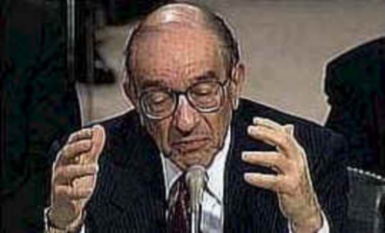Originally published on May 9, 2002
The U.S. economy, propelled by the biggest surge in consumer spending on pop-cultural references and ironic violence in two years, grew at an annual rate of 1.4 percent in the final quarter of 2001, the Federal government reported Thursday. Many economists were forecasting a revised 0.9 percent rate of advance in the GDP, which measures the total output of goods and services produced within the United States and is the broadest measure of the economy’s health.
The latest reading on the GDP comes one day after Federal Reserve Chairman Alan Greenspan told Congress the country is recovering from the recession that began in March 2001. “Though the recession may turn out to be one of the country’s mildest, Americans shouldn’t anticipate a robust rebound,” Greenspan cautioned. “We’re not really sure if the long awaited, upcoming Quentin Tarantino movie ‘Kill Bill’ is going to be any good. If it is as sedate and devoid of obscure pop-culture references and ironic violence as was ‘Jackie Brown’ then we could be looking at a 0.4 percent drop,” Greenspan noted. “Hopefully ‘Kill Bill’ will be heavily cross-promoted to our kids with the new Taco Bell Club Chalupa to create an economic safety net not only for the studio but for the rest of America as well.”
“Indeed, the children are our economic future,” said Doug Bandow, a research fellow with the Cato Institute who studies the correlations between art and commerce. “Now more than ever, we need to promote public policy within the government to allow the proliferation of pop-cultural references and ironic violence,” Bandow said. “The statistics are clear: the GDP, more and more, is becoming dependent on deciphering the subtle drug references within ‘Scooby-Doo’ and movie characters suffering humiliating violence in an ironic, absurd way.”
Bandow concluded that “whether we like it or not, we are slaves to the GDP and so we need to feed the coal fire of the GDP locomotive with whatever it takes. And who better to feed that GDP coal fire than John Q. Public, Jr. raised and conditioned to be entertained every waking moment?” Added Bandow, “In order to let the GDP flourish using these particular areas of industries, we need a government that is not so uptight about liberal, pop-culture obsessed, ironically violent art. We are never going to have government free market policy concerning that kind of art as long as people like Attorney General John Ashcroft are covering up naked statues in the Department of the Treasury.”
Indeed, the pop-culture reference and ironic violence has slowly become a recognized and respected facet of the economy by Wall Street. The Wall Street Journal, last week, reported that the Securities and Exchange Commission (SEC) has been discussing the possibility of creating a SEC regulated index to help establish and to help proliferate pop-cultural references and ironic violence as a future’s commodity. “Look at how ‘That 70s Show’ has already spawned ‘That 80s Show’,” said Alan Reynolds, a senior commodities analyst with Morgan Stanley. “Even though ‘That 80s Show’ bombed here, Russia is already in negotiations with the Fox network to purchase nine more years of it. So you see, even when the discerning and media-savvy teenage demographic market in the United States knows something is absolute crap, a profitable market value of that product can still be achieved by exporting that commodity to some other part of the world. As far as the example with Russia, they missed out on the 80s and the Rubik’s cube because they were behind the Iron Curtain eating cabbage soup. They want to make up for missing out on ‘Footloose’ and Cabbage Patch Dolls. Well…maybe not Cabbage Patch Dolls. But do you see how infinite the boundaries are of this rapidly growing economic trend?! Wall Street recognizes this and, hence, the reason for the creation of the POPDAQ index for futures commodities trading,” Reynolds concluded.
There is some speculation though by Wall Street observers on how well ironic violence can proliferate in a post 9-11 world. “Some have challenged that, while the establishment of the POPDAQ is valid, the establishment of a “VIODAQ” index to track ironic violence as a future’s commodity is taking things a bit too far.” said Dr. Robert Levy, Head of the School Economics at Stanford University. Even if pop-culture hip Johnny is willing to shell out 8 bucks at the local multiplex to delight in watching an Ivy League-educated, sociopath kill his victims as he ironically recites passages from Dante’s Inferno or dissects the meaning behind Phil Collin’s ‘Sussudio,” do we really want to use that as a valid economic indicator? Whatever happened to steel and coal?”
Justin Baker
